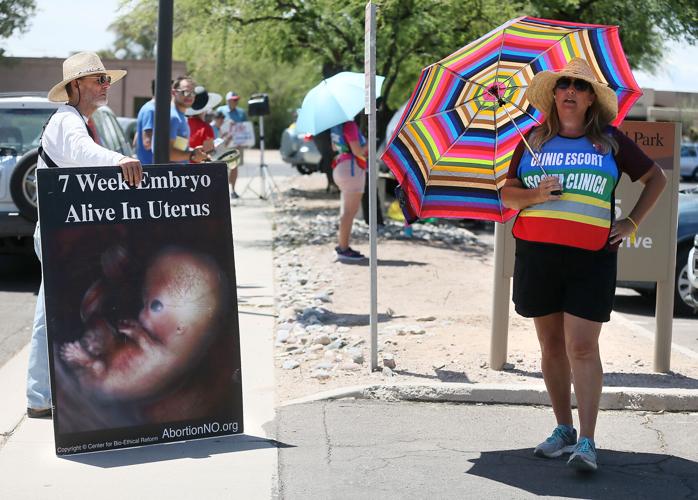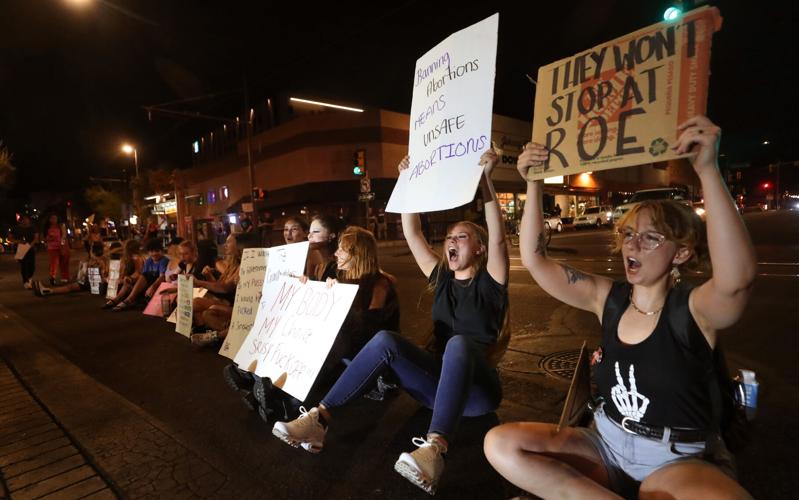PHOENIX т The УлшжжБВЅ Supreme Court will hear arguments Tuesday, Dec. 12, on whether УлшжжБВЅ women will lose virtually all rights to terminate a pregnancy.
The anti-abortion Alliance Defending Freedom wants the justices to overturn an appellate court ruling that a 2022 law allowing doctors to perform the procedure through the 15th week of pregnancy overrules a territorial-era law that outlaws abortion except to save the life of the mother.
The allianceтs main argument is that УлшжжБВЅ lawmakers never repealed the territorial law, even when the U.S. Supreme Court decided in 1973тs Roe v. Wade ruling that women had a constitutional right to terminate a pregnancy.
The nationтs high court overturned the Roe ruling last year in a case called Dobbs v. Jackson Womenтs Health, returning abortion regulation issues to each state. The abortion foes argue that means the УлшжжБВЅ law that was in effect in 1973, which makes performing an abortion a felony, is once again enforceable.
People are also reading…
The УлшжжБВЅ Court of Appeals ruled otherwise, however. The judges there sided with Planned Parenthood УлшжжБВЅ and Democratic Pima County Attorney Laura Conover, deciding that УлшжжБВЅтs 2022 law can be тharmonizedтт with the never-repealed older ban.
Whatever УлшжжБВЅтs justices eventually decide т there is virtually no chance they will rule from the bench т will define the rights of УлшжжБВЅ women and doctors going forward.
Even if the court upholds the pre-1973 law, it remains unclear whether any doctors would be prosecuted in the near future.
Thatтs because Democratic Gov. Katie Hobbs issued an executive order stripping the stateтs 15 county attorneys from handling abortion cases.
Instead, she gave that authority to Democratic Attorney General Kris Mayes. Mayes has said she will never prosecute a doctor for performing an abortion.
The case also is unusual in that it will be heard by only six of the seven justices.
Planned Parenthood had sought to have Justice William Montgomery recuse himself based on statements he made about the organization prior to being named to the bench in 2019 by then-Gov. Doug Ducey, a Republican. Montgomery initially refused, saying nothing he said while serving as Maricopa Countyтs elected Republican county attorney could affect his ability to decide the case fairly.
Montgomery recently reversed himself, saying he sees an issue in the Code of Judicial Conduct that would require him to step aside. He did not explain.
At that point, Chief Justice Robert Brutinel could have tapped a retired justice or an active judge from the state Court of Appeals to fill out the bench. But Brutinel decided against that, giving no reason.
While it is impossible to handicap how the other justices would vote, that decision could aid Planned Parenthood.
Under normal circumstances, Planned Parenthood would need the votes of four of the seven justices to uphold the appellate court ruling. But with just six, it needs just three votes, as a tie means the lower court ruling stands.
The outcome of the case also could have ripple effects in the November election.
Planned Parenthood and other groups are gathering signatures in hopes of putting a measure on the 2024 ballot to enshrine the right to abortion in the УлшжжБВЅ Constitution.
A decision by the court to keep abortions legal through 15 weeks could reduce support for a more expansive law. Out of 13,896 abortions performed in УлшжжБВЅ in 2021 т the most recent data available т just 824 were on women who were more than 15 weeks pregnant.
Conversely, a decision by the court to return УлшжжБВЅ to the pre-1973 days, when abortions could legally occur only to save the life of the mother, with no exceptions for rape or incest, could spur support for such a measure.
The idea that the 15-week law supersedes the older law has drawn support from Ducey. He was the one who signed that law in 2022, before the U.S. Supreme Court ruled in the Dobbs case.
The premise to the law Ducey signed was that the U.S. justices would simply uphold a Mississippi statute with a 15-week ban. The 2022 УлшжжБВЅ law was designed to have a nearly identical law in place in УлшжжБВЅ, where, until the Dobbs decision, abortions could be performed until the point of fetal viability, generally considered between 22 and 24 weeks.
Ducey, in signing that law, acknowledged it contained language spelling out that УлшжжБВЅ was not repealing the territorial-era law. But he insisted that abortions would not become illegal here even if the U.S. Supreme Court eventually did what it did т overturn Roe.
тThe law of the land today in УлшжжБВЅ is the 15 weeksт law,тт he told Capitol Media Services at the time. тAnd that will remain law.тт
Ducey said it was irrelevant that the pre-1973 law never was repealed and remained on the books. тI think that the law you sign in 2022 supersedes 1973,т he said.
Less clear is how any ruling on this dispute between the two laws will have on another one that lawmakers approved and Ducey signed in 2021.
It makes it illegal for doctors to perform an abortion if they know the sole reason a woman wants to terminate the pregnancy is because of a fetal genetic defect. U.S. District Court Judge Douglas Rayes upheld that law in the wake of the U.S. Supreme Court overturning Roe, saying the nationтs high court eliminated the constitutional right of doctors to perform abortions and the right of patients to receive them.
But the 9th U.S. Circuit Court of Appeals said the doctors have an interest in not being penalized for what they believe is a vague law and sent the case back to Rayes, where it now stands.
Howard Fischer is a veteran journalist who has been reporting since 1970 and covering state politics and the Legislature since 1982. Follow him on X, formerly known as Twitter, and Threads at @azcapmedia or email azcapmedia@gmail.com.










